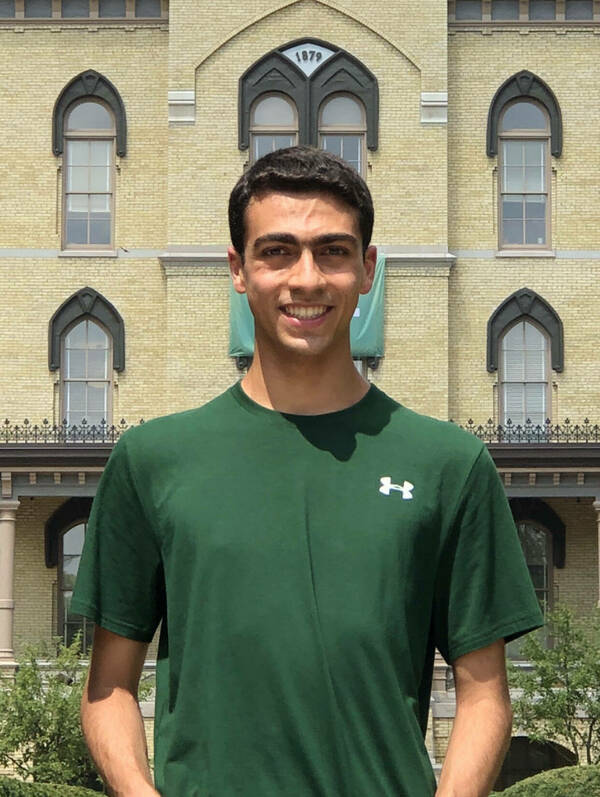
Shaker Erbini '24 has long known he wanted to be a doctor. Last summer, he shadowed two medical doctors and shared his experience in our Sophomore Summer Profile. When we checked in with him this semester and he shared his extra-curricular activities, we knew we needed to highlight this thoughtful and discerning scholar.
1. How are you supplementing your academic work in Neuroscience with practical experience?
I am supplementing my academic studies with practical work by volunteering at Memorial Hospital 3 hours weekly as a Patient Comfort Rounds Volunteer, volunteering 1 hr at a Hospice as a Companionship volunteer, volunteering as an online English Tutor 2 hours weekly through the nonprofit organization Paper Airplanes, and volunteering at the food bank when I have free time. I have these activities spread out across the week so I am not too overwhelmed. From my experience, academic studies and practical work have a relationship where doing one helps me perform better at the other because I get a break for doing the same thing, I use different parts of my brain, and I get to be in different settings. I have found this variety in focus and setting to be very refreshing.
2. How did you find out about these opportunities?
I found out about the volunteer program at Memorial Hospital as I was browsing the LinkedIn page of a former Notre Dame student who is now in medical school. I then asked an upperclassman who was on the Leadership committee for my major through an online Zoom Meeting this past summer about the program, and he told me it was very common for premeds at ND to volunteer here, so I decided it was a good way to gain clinical experience. Regarding Paper Airplanes, I also found out about that opportunity as I was browsing the LinkedIn page of a different Notre Dame student who isn't premed. I learned about hospice through an email that was sent out to all Neuroscience and Behavior majors last school year. I didn't want to participate at the time, but I made sure to remember to consider taking the opportunity in the future, and I did. I completed the orientation process by getting the necessary tests, filling out the necessary papers, and doing Zoom meetings this past summer. I'm glad I did the orientation process over the summer because it was long and it allowed me to be ready to start volunteering right at the beginning of this academic year. This past summer, I volunteered at the local food bank back home and did some shadowing, so I wanted to continue volunteering in a food bank here in South Bend during the semester. For that, I looked up local food banks, chose one, and filled out the necessary form to be a volunteer.
3. What is the best part about doing volunteer/hospice work?
The best part about doing hospital and hospice volunteer work is the ability to interact with patients. As one of the doctors I shadowed this past summer said, "medicine is an art of communication." A doctor must not only be able to speak with the patient clearly and concisely, but must also be able to make the patient feel comfortable when they are in a state of distress. As a hospital and hospice volunteer, my primary role is to make patients feel comfortable, so I get to practice this skill right now to prepare me for the future. As an introvert, these volunteer roles also help me feel more comfortable in social situations.
4. What have you learned about yourself?
I have learned that at the current moment, I am drawn to medicine for two reasons. The first is the patient communication aspect. Even though I find it somewhat hard because I am an introvert, I love the fact that communication with the patient involves so much psychology, which I am very passionate about. The tone of voice, connotation of words, line of reasoning, and appeal to values are aspects of communication that must be chosen with care in order to almost persuade the patient to a state of mind of comfort. It reminds me a lot of writing an essay, which part of me likes to do for the very same reasons. The other thing that I've learned is that medicine involves a lot of teaching. Even when I introduce myself to my patients at hospice and the hospital, I am teaching the other person about me. This is not to mention that in medicine, doctors teach each other and teach their patients what is going on in their bodies. Since teaching is something I like to do, this aspect of medicine also appeals to me.
5. Would you recommend this work to others? Why/why not?
I would highly recommend working in clinical settings to others considering medical school because it gives a person a small taste of what it would be like to go into medicine. One reason medical schools require clinical experience is so that they know applicants know what they are getting into. Putting yourself in positions where you aren't necessarily performing medical procedures, but are getting to simply observe the clinical setting and interact with patients is a great first step to know whether this type of work is right for you and should be pursued further.